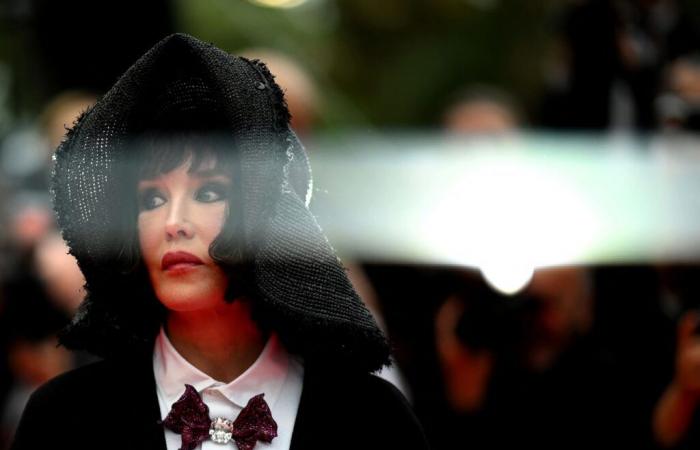Paris Match. In the preamble to your book, you confide: “I have never occupied myself with writing. I never allowed it, I never really forbade it, it was never a question for me.” The following sixteen pages and your beautiful speech in tribute to Natalie Portman at the last Deauville Festival nevertheless attest to your magnificent writing!
Isabelle Adjani. writing has always been a question for me, but one that I have never really… questioned, in fact! A bit like Montaigne, “I am capable of doubting a lot, and even doubting my doubt!”. It’s called having a spirit of contradiction, isn’t it? [Elle rit.] I find it rejoicing that actresses like Sophie Marceau, Anne Parillaud, Sylvie Testud, Isabelle Carré or Isild Le Besco, whom I read with emotion, are starting to publish with such great confidence and in such a successful way. It’s stimulating and engaging: so an actress can write, just like a writer can act!
Were you blocked by the gaze of others and the fear of being judged?
Unless you have a literary gift, I believe that you must have read endlessly to write. And I consider that I have not read enough to acquire this legitimacy. But why not one day? This may be my last story to come. I have always loved writing. It was the dazzlement of literature that made me grow in desire, not to say obsession, with the text! The virtuosity of an actress is linked to words, to dialogues, to what is written as well as to what is not written but is still written in silence and listening. I recently discovered the film by the brilliant Sophie Fillières “Stop or I Continue”. The power of the dialogues between the characters of Emmanuelle Devos and Mathieu Amalric is pure writing, and it literally overwhelmed me, thunderstruck me! Some writers are striking, dazzling. There are some who, from their first novel, become essential: Rimbaud of course, Sagan, Yourcenar, Kerouac, Guibert, Koltès… Through their voice, their style and their vision, they “justify the world”, as Camus wrote . Others, huge ones, take more time, Nathalie Sarraute, for example, or Pierre Michon.
But your publisher didn’t encourage you to continue writing?
We have to put things right: “On the side of Marilyn’s” is not a book that I wrote alone, it is the extension of a text written jointly with Olivier Steiner, who, he is a true writer. This work brings together extracts from interviews that I have given in my career. It even consisted of six hands, since we invited Marilyn through the words of her last interview, given a few days before her death. It is neither a novel nor an essay. This flow would be as much a polymonologue as an autofictional conversation. Who is speaking? Her or me? When there’s too much of me, I join Marilyn. When Marilyn is attacked by too many “sunlights”, she comes into my shadow. We talk to each other, we listen to each other, we wait together, we follow each other… It’s difficult to describe this fusional relay, first performed on stage, taking the liberty of being rare and modifying the text at almost each performance. , from Paris to New York via the village of Lacoste. In the theater, it was a meeting with “Le vertige Marilyn”, with “Du Côt de Chez Marilyn”, all the things spoken and said on stage resonate through the writing. After all, there are people who write as if they were speaking out loud, aren’t they Marguerite Duras? [Elle rit.]
Duras! This is your absolute reference, right?
Yes, because it is still the most shocking, in the sense that each of his sentences is a shock. Hey, right now, I’m in Trouville. She wrote: “As soon as I move away from Trouville, I have the feeling of losing the light. I lose the mist of the open sea, the wind. To look at the sea is to look at the whole. It was in Trouville that I looked at the sea until nothing.” And here I am in the spray, even closer to the sea through his words. How does she manage to translate the emergence of thought so well? It revives writing by turning our minds around.
“Books are protective presences”
You admit a particular love for the book object, to the point of being “suffered from tsundoku” you write, a Japanese word designating the acquisition of works that you will read later…
It’s just an insatiable need to read, reread, leaf through, discover, hoping to break away from time. Because the time to read, to think, to write must be chosen. But my life and my job mean that time is most often suffered, taken away or subtracted from me. So books are protective presences; books, for me, mean being surrounded by what resembles me. Can we live peacefully with what resembles us? I’m not sure.
The rest after this ad
You write that all actresses owe something to Marilyn Monroe. What exactly do you owe him?
To have understood very early on that beauty is not devoid of pain. Olivier Steiner highlighted this quote from Virginia Woolf: “The beauty of the world, which is so fragile, has two edges, one of laughter, the other of anguish, cutting the heart in two.” That says it all, right? I discovered Marilyn through her painful affair with Arthur Miller: the story of the superstar who seeks validation of her existence in the eyes of the most revered intellectual in the United States, he, supposed to know everything, she, supposed to know nothing.
Do you think he didn’t like her?
What do I know, after all? I am tempted to believe that he did not really love her beyond her image, because Miller had described her in personal correspondence as a boring, banal, vindictive and punitive woman. Marilyn had been shocked when she found out. But he would also have written that she had more courage, intimate decency, sensitivity and love for humanity than anyone he had known in his life. Well… They shared five years of life together. The end of the story is a film, “Les déaxés”, the film of their separation, Marilyn’s last.
“We endure excess, deprivation of freedom, the vampiric expectations of certain others”
Like her, you have been spied on in your every move and have paid the price of glory through an unbearable daily life…
Unbearable, I don’t know, but we endure excess, deprivation of freedom, the vampiric expectations of certain others. It’s like a sanction. Today, with social networks, it would be worse. If they had existed in those years, I probably would have died.
Some of your choices as a young actress, like playing in “Possession,” were guided by your “life at the time.” [qui] was totally confused with this so-called dramatic art,” you write. Is there no more confusion today?
There is an age where putting oneself in danger is possible, one is not afraid for one’s balance, one is not afraid of confusion. We don’t experience it as such at that moment. We live headlong, we seek intensity, we live to death. But when the time comes to better understand what life is, by feeling death, by losing one’s parents, one’s friends, one’s faith in humanity, we calm things down. Both literally and figuratively.
Like in “Masquerade” where you play a fallen star. You are no longer confused but self-deprecating…
Self-deprecation requires maturity, and, if one can sometimes take pleasure in confusing me with my characters, I take pleasure in blending into a resemblance that is as true as possible because, after all, creating an illusion is is my artistic mission. I’ll end on a wink without false eyelashes with the story of Marilyn’s green Pucci dress. During a press conference in Mexico, a journalist exclaimed when he saw her appear: “Marilyn, what a dress!” And Marilyn replied: “And yet, you haven’t seen it on its hanger!”
“On the Marilyn side”, by Isabelle Adjani and Olivier Steiner, ed. from the Observatory, 160 pages, 15 euros.
© DR
Canada






